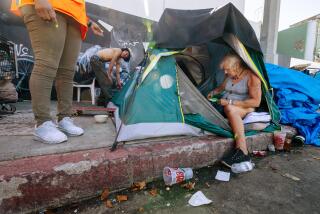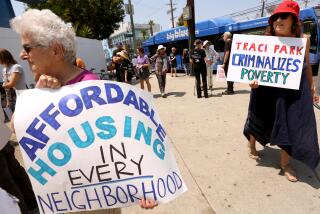Mahony Says Civic and Religious Leaders Fail to Act on Homelessness
Cardinal Roger M. Mahony on Thursday faulted the political, business and religious leaders of Los Angeles for failing to tackle the issue of homelessness and called for expanded funding of affordable housing and an end to downtown police sweeps.
“Some see a homeless person and judge them to be a failed human being,” he told the audience of 100 at a breakfast sponsored by the Los Angeles Archdiocese’s Commission on Justice and Peace.
“But I see a failure of political will, a failure of our market economy, of our philanthropic and religious institutions, to come to grips with a problem that will not disappear with the next upturn in the business cycle.”
The cardinal called on city officials to crack down on slumlords. He also endorsed a proposed ordinance that would offer incentives to developers to set aside low-income units when building market-rate housing projects. The Los Angeles City Council is debating the proposal.
Mahony’s positions are likely to lend moral authority and political heft to an issue that has become an increasing focus of attention as Los Angeles attempts to remake its urban core. High-profile downtown projects include the Walt Disney Concert Hall, the Cathedral of Our Lady of Angels and hundreds of expensive, new residential lofts.
Officials estimate that as many as 84,000 people are homeless on any given night in the county, and that an increasing number of them are women and children.
The cardinal is a member of a task force of top civic leaders scheduled to meet next month to begin devising a 10-year plan to end homelessness. He said he would address the issue of police sweeps -- which he said “clogs the jails with homeless people for the crime of being out of work” -- with Los Angeles Police Chief William J. Bratton, who also is on the panel.
LAPD spokesman Lt. Art Miller, responding to Mahony’s remarks, said that police are responsible for maintaining a crime-free environment, and that they respond to requests from businesses and residents.
Another speaker at the meeting, Carol Schatz, president of the business-supported Central City Assn., also said that laws must be enforced and that various categories of homeless people -- such as the mentally ill, aggressive panhandlers and parolees -- require various kinds of attention.
City Councilman Antonio Villaraigosa, meanwhile, said officials must get tough in insisting that all areas of the city and county share the burden of resolving the crisis of homelessness.
“There are those who don’t see this as an emergency, and we’re going to have to convince them that this is an issue that affects not just the homeless or poor, but everyone,” he said.
Another speaker, Philip Mangano, executive director of the federal government’s Interagency Council on Homelessness, called the plight of the homeless in Los Angeles and other cities a “disgrace.”
“A few months ago I was in Los Angeles and visited skid row, and it was hard to believe we were still in this country. You would think we had crossed into a Third World favela,” he said, using the Portuguese word for slum.
He used the occasion to announce nearly $5.7 million in federal aid for the homeless in the city. The money will be used to provide housing, job training and mental health and substance abuse services to chronically homeless people, the disabled and veterans.
More to Read
Sign up for Essential California
The most important California stories and recommendations in your inbox every morning.
You may occasionally receive promotional content from the Los Angeles Times.










